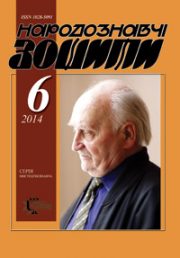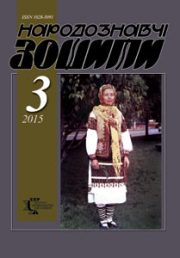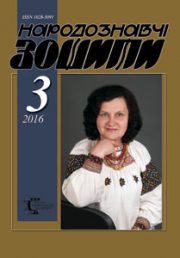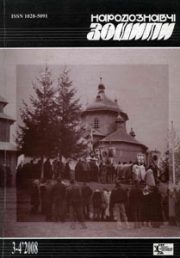The Ethnology Notebooks. 2019, № 4 (148), 842—849
УДК 398.7(476)
DOI https://doi.org/10.15407/nz2019.04.842
SYSTEM OF VARIANTION FACTORS IN THE SONG FOLKLORE
MAZURYNA Natallia
ORCID ID: https://orcid.org/0000-0001-5632-7844
Candidate of Philology, Associate Professor of literary studies
Doctoral student of the Department of culture of Slavic peoples and folklore of the State scientific institution «Center for research of Belarusian culture,
language and literature of NAS of Belarus»
Contacts: е-mail: mazurynang@tut.by
Abstract. The article investigates the system of variation factors in relation to the works of song folklore. The author analyzes the variation, which is a characteristic feature of almost all phenomena associated with language and human creativity. In the sphere of song folklore, verbal and musical languages are combined, which simultaneously change in the current socio-cultural conditions. In some Sciences like linguistics, ethnomusicology, Ethnology – a number of factors are identified that belong to each of these disciplines. The purpose of the article is to identify factors of variation of folk songs by using the method of system analysis in the framework of folkloristic research. Conclusions are made on the material of East Slavic, mainly Belarusian song folklore.
The article is a historical and theoretical study that considers the variation both in a specific folkloristic and in a broad context. This approach to variation is relevant to the point of view that it opens up new opportunities for researchers to understand the laws of the organic relationship between the arts of speech and music, inextricably combined in folk songs. The study of variation from the standpoint of the synthesis of arts has allowed a deeper understanding of the nature of this phenomenon and to identify the system of variation factors with special universal significance.
Keywords: variation, song folklore, factor, verbal language, musical language, tradition, changes.
Received 9.07.2019
REFERENCES
Lozkа, А., & Маzurynа, N. (2015). Belarusian folklore: calendar and calendar-ritual poetry. Minsk: BDPU [in Belarusian].
THE RITUAL YEAR 11.(2018). Traditions and Transformation. The Yearbook of the SIEF (Sociйtй Internationale d’Ethnologie et de Folklore) Working Group on the Ritual Year. Kazan; Moscow: Vol. 8.
Starichenok, V. (2008). Large linguistic dictionary. Rostov-n/D: Feniks [in Russian].
Gorbachevich, К. (1989). Norms of modern Russian literary language (3th ed.). Мoskva: Prosveshchenie [in Russian].
Studies in Sociolinguistics by William Labov. (2001). Beijing: Beijing Language and Culture University Press.
Vishnjakova, N. (1995). Creative psychopedagogics: Psychology of creative learning. Minsk: NIORB «Poli Big» [in Russian].
Tavlaj, G. (2018). Criteria of mastery of Belarusian song ritual tradition bearers. Traditional folklore of the peoples of Russia and CIS countries (Abstracts of the International Congress). Sankt-Peterburg [in Russian].
Samoilava, Е. (2018). «Spivayu taky iak dusha moya spivae»: Folk musician in the context of modern culture. Traditional folklore of the peoples of Russia and CIS countries (Abstracts of the International Congress). Sankt-Peterburg [in Russian].
Аtroshchanka, J. (2011). Gender folklore: the state and problems of modern research. Hive and bees. Vectors of modern folklore school of BSU (pp. 197-202). Міnsk: Рrava і ekanomіka [in Belarusian].
Malcev, S. (1991). On the psychology of musical improvisation. Мoskva: Мuzyka [in Russian].







